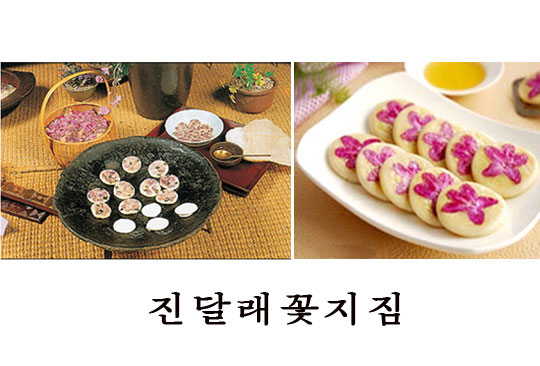Samwolsamjil(the third day of the third lunar month)
Samwolsamjil is one of the folk festivals enjoyed by our ancestors in the past.
In the historical records, Samwolsamjil (the third day of the third lunar month) was introduced as Tapchongjol and it was called as Samjitnal among the people.
Tapchongjol means that it’s a holiday on which people go out to mountains and fields and enjoy treading the grass which was spread like a green carpet.
On this holiday, our people enjoyed hunting and flower-shaped pancake picnic.
According to The Chronicles of the Three States, hunting and martial art competition were held on the Rangnang Hill as a national grand festival on every third day of the third lunar month in Koguryo and winners were appointed as military officers.
Ondal, general of Koguryo, was appointed as a general in the hunting competition on this very day.
Special event of this day was a flower-shaped pancake picnic which was called Kkotdarim (azalea blossom party).
On this day, with family or close people, they went out to mountains and fields where the larks trill and the shimmer of heat is dancing in the air and made azalea blossom pancake and tasted the azalea liquor which had been prepared the year before enjoying the spring’s fragrance.
Azalea blossom pancake was called hwajon. They prepared azalea floral leaves and kneaded with the rice flour and fried in sesame oil. The picnic of making this flower pancake was called flower-shaped pancake picnic.
On this day, besides flower-shaped pancake, they also fried mung bean pancake. People prepared and ate sumyon which was made by adding honeyed water to the mung bean noodle or hwamyon which was made by adding juice from the fruit of Schizandra chinensis, honeyed water and pine nuts to the chopped noodle made by kneading mung bean flour and floral leaves.
On this day, men used to compose poems and chant songs on the theme of beautiful spring scenery and women used to wash their hair at the riverside saying that the hair will be lovely and lustrous if they wash their hair on this day.
Children also enjoyed this day playing plant-gathering game or flower gathering game in which they gathered various kinds of flowers and grasses and joined them crosswise and pulled it. They competed which would be cut or who knew more names of the gathered flowers and grasses.
In the lyric of the song “Fallen Blossoms on Running Water”, well-known song of the period of enlightenment, there is a part saying “a vow made by tying up the green grasses” and this means the friendship and promise of the childhood which were formed by playing this grass-gathering game.
M.A. Ryu Chung Song, Korea National Heritage Preservation Agency
